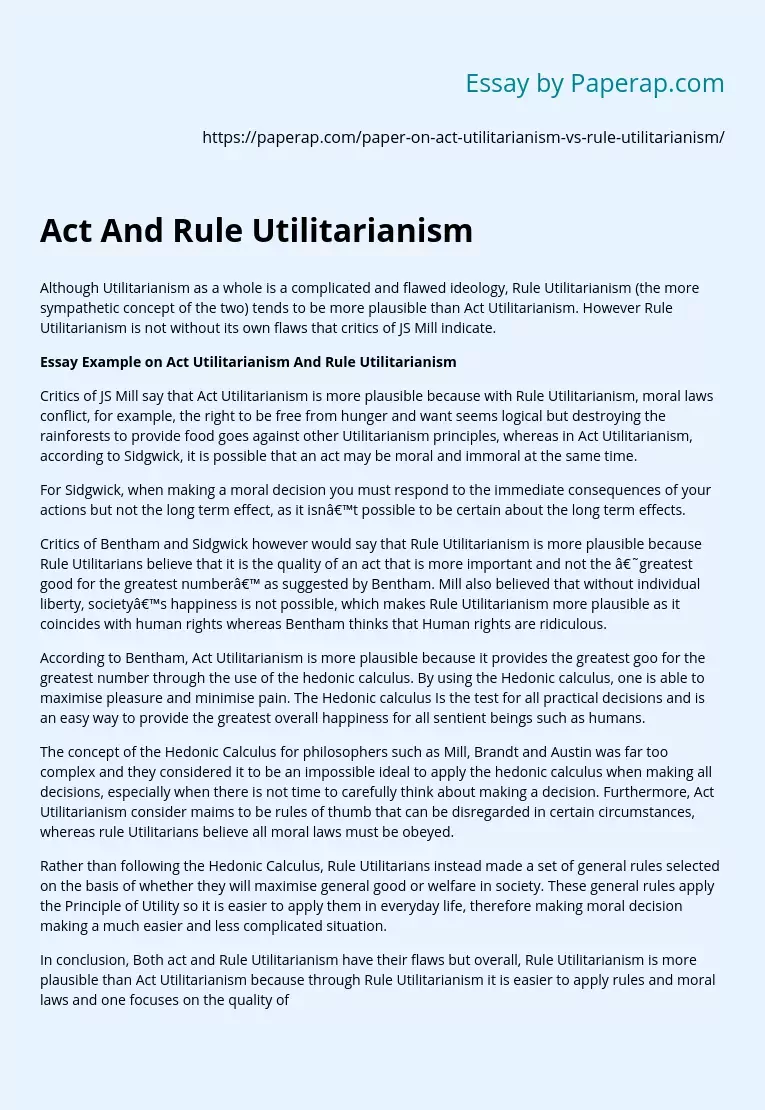Act And Rule Utilitarianism
Although Utilitarianism as a whole is a complicated and flawed ideology, Rule Utilitarianism (the more sympathetic concept of the two) tends to be more plausible than Act Utilitarianism. However Rule Utilitarianism is not without its own flaws that critics of JS Mill indicate.
Essay Example on Act Utilitarianism And Rule Utilitarianism
Critics of JS Mill say that Act Utilitarianism is more plausible because with Rule Utilitarianism, moral laws conflict, for example, the right to be free from hunger and want seems logical but destroying the rainforests to provide food goes against other Utilitarianism principles, whereas in Act Utilitarianism, according to Sidgwick, it is possible that an act may be moral and immoral at the same time.
For Sidgwick, when making a moral decision you must respond to the immediate consequences of your actions but not the long term effect, as it isn’t possible to be certain about the long term effects.
Critics of Bentham and Sidgwick however would say that Rule Utilitarianism is more plausible because Rule Utilitarians believe that it is the quality of an act that is more important and not the ‘greatest good for the greatest number’ as suggested by Bentham.
Mill also believed that without individual liberty, society’s happiness is not possible, which makes Rule Utilitarianism more plausible as it coincides with human rights whereas Bentham thinks that Human rights are ridiculous.
According to Bentham, Act Utilitarianism is more plausible because it provides the greatest goo for the greatest number through the use of the hedonic calculus.
By using the Hedonic calculus, one is able to maximise pleasure and minimise pain. The Hedonic calculus Is the test for all practical decisions and is an easy way to provide the greatest overall happiness for all sentient beings such as humans.
The concept of the Hedonic Calculus for philosophers such as Mill, Brandt and Austin was far too complex and they considered it to be an impossible ideal to apply the hedonic calculus when making all decisions, especially when there is not time to carefully think about making a decision. Furthermore, Act Utilitarianism consider maims to be rules of thumb that can be disregarded in certain circumstances, whereas rule Utilitarians believe all moral laws must be obeyed.
Rather than following the Hedonic Calculus, Rule Utilitarians instead made a set of general rules selected on the basis of whether they will maximise general good or welfare in society. These general rules apply the Principle of Utility so it is easier to apply them in everyday life, therefore making moral decision making a much easier and less complicated situation.
In conclusion, Both act and Rule Utilitarianism have their flaws but overall, Rule Utilitarianism is more plausible than Act Utilitarianism because through Rule Utilitarianism it is easier to apply rules and moral laws and one focuses on the quality of happiness rather than the quantity, which can often lead to impractical decision making (for Act Utilitarians.)
Act And Rule Utilitarianism. (2019, Nov 27). Retrieved from https://paperap.com/paper-on-act-utilitarianism-vs-rule-utilitarianism/

